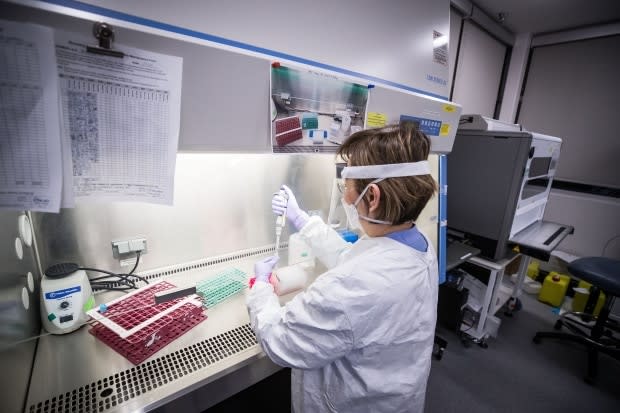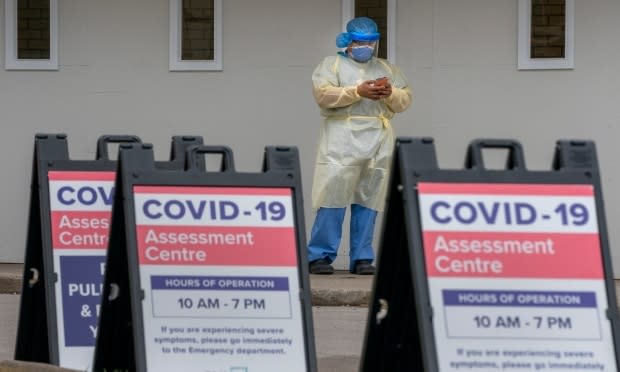Testing at Ontario's COVID-19 assessment centres slows to a trickle
Ontario's COVID-19 assessment centres are mostly empty, with only a handful of people showing up to be tested each day, according to research by CBC News.
The province's hospitals established at least 68 assessment centres last month to screen for the coronavirus, yet medical professionals have been dissuading all but the highest-priority cases from going there because of limited testing equipment.
Even when people with COVID-19 symptoms get an official referral for testing, the centres refused to test 25 per cent to 30 per cent of those who showed up this past week, according to figures provided by the Ministry of Health.
It's raising questions about how quickly Ontario will boost its testing rate to 13,000 per day as demanded by Premier Doug Ford on Wednesday. The province reported 4,097 new test results Thursday.
Physicians at assessment centres tell CBC News they have been directed to limit their testing to priority groups such as health-care workers and not to test members of the general public, even if they have symptoms.
The restrictions on testing are "difficult and frustrating," Dr. Camille Lemieux, medical director of the COVID-19 assessment centre at Toronto Western Hospital.
"We all want to do the best for our patients, and offer the best we can in terms of testing and care, but at the moment the guidelines are not really permissive to allow us to do that," Lemieux said Thursday in an interview with CBC News.
If someone comes to the assessment centre with symptoms of COVID-19, said Lemieux, "the first thing I want to do with that patient is to try and confirm whether they have COVID or not and [I] want be able to test them."
She said Toronto Western's assessment centre is testing only a few dozen people per day and she is urging the Ministry of Health to loosen its restrictions.
A physician working at an assessment centre in Ottawa, Helen Hsu, said she is turning away people with symptoms for testing because of a shortage of the most effective type of swabs.

Hsu said that assessment centre is no longer usings nasopharyngeal swabs, which reach deep into the back of the nasal cavity. Instead, the centre is using "alternative test kits" with throat swabs, which Hsu says have lower sensitivity to the virus and a higher rate of false negatives.
"These swabs are far from perfect," she said. "If [patients] get a negative test result, they should not assume they are in the clear and stop social isolation."
CBC News has repeatedly asked the Ministry of Health to provide data on how many people are being tested at the assessment centres daily and how many are being turned away, but officials have yet to provide that information.
When assessment centres were first set up in mid-March, lineups and long waits were reported. But that has changed.
"At some of the assessment centres, for one reason or another, the volume hasn't been there," said Ford during his Thursday news conference, but offered no details.
Priority cases expanded
Since they were launched, the assessment centres were ordered — if they have shortages of testing supplies — to give priority to health-care workers and people from remote communities.
Each assessment centre is responsible for reporting any shortages to Public Health Ontario (PHO), said Travis Kann, director of communications for Health Minister Christine Elliott.

"As of this morning, no critical shortages have been reported. If one were, PHO would quickly ship additional swabs to ensure testing continues uninterrupted," Kann said Thursday in an email to CBC News."We are confident that we have the supplies needed to support expanded testing."
The province expanded testing priorities on Thursday to include "symptomatic first responders" and "individuals referred for testing by local public health."
Other cases previously designated by the province as a testing priority included hospital in-patients, along with residents of long-term care centres and retirement homes, but it is unclear that those cases would be tested at assessment centres.
Turned away despite symptoms
Dozens of people have contacted CBC News to describe their experiences of being rejected for testing at the assessment centres despite showing symptoms.
Diane Mossman, 77, said she was given an appointment Wednesday for the assessment centre at Michael Garron Hospital in Toronto after reporting symptoms of cough, difficulty taking deep breaths, extreme fatigue and mild fever.

"There was no line-up. Only one person was ahead of me and almost finished. There was no one waiting to be seen after me," Mossman said in an email.
Three health-care workers screened her before she saw a doctor, who Mossman says was apologetic but told her she didn't meet the criteria for testing, despite her symptoms.
"I was so stunned to hear this and to realize that I couldn't have the test, that I didn't ask more questions," said Mossman.
"I'm distressed at this situation. I've never felt this kind of sickness before, and I'm worried that I do have COVID."
During his Thursday news conference, Ford was asked if he could guarantee that members of the public will not be turned away if they show up at assessment centres with symptoms of COVID-19.
"If they have symptoms, they should be tested," Ford said. "We want to test as many people as possible right across this province."
Assessment centres have varying rules about getting tested: many require a referral from a health-care professional, while some allow walk-ins to be screened.
"It is up to a physician and their clinical assessment of a patient to determine whether a test in necessary," said Kann.
One sign of how narrowly Ontario is testing for the coronavirus: the percentage of positive tests is tracking far higher than in the rest of Canada.
Over the past week, 11.4 per cent of Ontario's newly reported tests have shown a confirmed case of COVID-19. Excluding Ontario, just 4.8 per cent of tests conducted in the rest of the country have come back as positive since testing began in January, according to data from the Public Health Agency of Canada.


